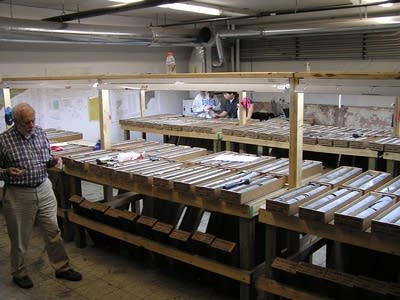Global copper and nickel demand spurs exploration on the Range
Go Deeper.
Create an account or log in to save stories.
Like this?
Thanks for liking this story! We have added it to a list of your favorite stories.

Ernie Lehmann has been looking for gold in northeast Minnesota gold for more than 30 years. Not just gold, but copper and nickel, and a group of precious metals including silver, platinum and palladium.
You need to take a boat to his claim near the town of Babbitt. An 85-foot-long barge is anchored on Birch Lake, with a tall drilling rig and a deck stacked with heavy steel pipe.

Lehmann is talking to a small group of visitors on board. He explains how crews grind a seven-inch diamond drill bit deep under the lake, through bedrock, to the minerals 1,300 feet below. He wants to dig an underground mine, right under Birch Lake.
Lehmann says the metals there are increasingly valuable.
Turn Up Your Support
MPR News helps you turn down the noise and build shared understanding. Turn up your support for this public resource and keep trusted journalism accessible to all.
"The metal markets have been very strong, and we really expect them to be strong for quite a while," Lehmann says.
Lehmann says the demand comes from rapidly developing places like India and China.

"(Places) who are moving rapidly from being really Third World countries to developing a much larger middle class, and whose wants of physical products -- whether it's refrigerators, or cars, or gutters on houses, or what have you -- is increasing so rapidly," Lehmann says.
At best, Lehmann's underground mine is still several years away. But PolyMet Corp. is working on an open pit mine near Hoyt Lakes, which could be in development in another year. And there are others interested as well.
Companies including Teck Cominco and Kennecott have signaled renewed interest in Minnesota ore. Others are test drilling this summer. Three projects are in the Superior National Forest south of Ely.
Ernie Lehmann's Birch Lake Project and the PolyMet mine, combined, would directly employ 800 people.
"It's just a new mining opportunity that would be just a wonderful revitalization for our region," says Frank Ongaro, who speaks for a mining public affairs group called Mining Minnesota.

Key to the current wave of proposals is new technology that uses pressure and steam, instead of dangerous solvents, to get the metals out of waste rock.
"The technology over the last 10 years or so has improved to not only extract the metals profitably, but to do it in an environmentally responsible manner. Long gone are the days of smelters," Ongaro says.
But mining the rock that holds these minerals can cause a troubling side effect, from sulfide chemicals in the rock. Sulfides are known to form acids when exposed to air and water. Acid pollution from mining has blighted the land and killed rivers in Montana and other western states.
Just downstream from Ernie Lehmann's project is the Kawishiwi River, which flows right into the Boundary Waters Canoe Area Wilderness. That's making a lot of people nervous.
"We're very concerned about it. We've been very concerned about it for quite a while."
"We're very concerned about it. We've been very concerned about it for quite a while," says Ron Meador, executive director of the group Friends of the Boundary Waters Wilderness.
"What you have here are mines that are at or very near the edge of the wilderness. There's noise. There's dust. There's disruption of landscape," Meador says. "But it's really the acid mine drainage that concerns us the most. And the drainage in these cases, in the Kawishiwi and the Birch Lake site, would go into the Kawishiwi River and the wilderness."
This kind of mining is new territory for Minnesota's environmental groups and for the state. Mining Minnesota's Frank Ongaro says there will be stringent environmental oversight from regulators like the Minnesota Pollution Control Agency.
"All these companies are committed to meeting or exceeding Minnesota's strict environmental standards and regulations," Ongaro says. "And these companies will have to show that they are able to meet or exceed the exacting standards that the state has, in order to operate."
The test will come soon enough. PolyMet is expected to apply for environmental permits by the end of 2007. Ernie Lehmann's project is a couple of years behind.




